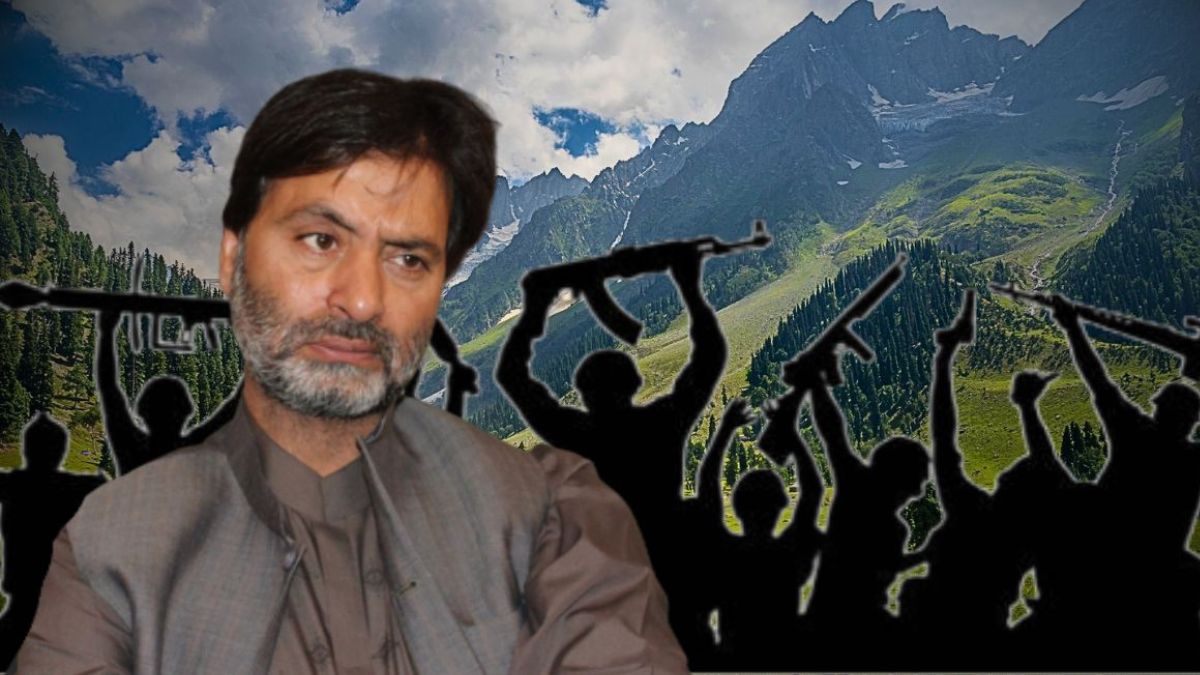Yasin Malik, once projected as a political leader under the banner of the Jammu and Kashmir Liberation Front (JKLF), today stands exposed as a convicted terrorist. Courts in India have held him guilty of terror-funding, and he is currently serving a life sentence in Delhi’s Tihar Jail.
The National Investigation Agency (NIA) has sought enhancement of this sentence to the death penalty, underlining the severity of his crimes.
Far from being a “freedom fighter,” Malik played a central role in Pakistan’s proxy war in Kashmir. His career is a case study in how terrorism can be cultivated, financed and sustained by external sponsors while being disguised as a political movement.
Who is Yasin Malik and what role did he play in kashmir?
Yasin Malik rose to prominence in the late 1980s as a founding leader of the JKLF. Under his leadership, the group carried out acts that remain etched in the history of terrorism in Kashmir.
Among the most notorious incidents was the December 8, 1989 abduction of Rubaiya Sayeed, daughter of then Union Home Minister Mufti Mohammad Sayeed. Soon after, on January 25, 1990, four unarmed Indian Air Force personnel were shot dead in Srinagar.
Witness testimony in 2024 directly identified Malik as one of the shooters. Security establishment sources say these actions were “seminal acts of terror” that set the tone for Pakistan’s proxy war strategy.
For Kashmiri Pandits, Malik is remembered as one of the figures responsible for the climate of targeted terror and intimidation that forced their exodus from the Valley in the early 1990s.
How was Malik supported by Pakistan?
Officials familiar with the investigations state that Malik’s operations were made possible through Pakistan’s patronage. Funding was channelled via hawala networks and organisations linked to groups such as Lashkar-e-Taiba (LeT).
The Ministry of Home Affairs (MoD) banned the JKLF under the Unlawful Activities (Prevention) Act in 2019, extending the ban in 2024.
Government dossiers noted that Malik’s outfit had become a conduit for Pakistan’s strategy of bleeding India through terrorism. Security sources describe him as “one of Islamabad’s most valuable proxies in Kashmir.”
What legal proceedings is Malik facing today?
On May 25, 2022, Malik pleaded guilty in an NIA terror-funding case and was sentenced to life imprisonment. The NIA has appealed for a death penalty, and in August 2025 the Delhi High Court sought his response.
In addition, Malik remains an accused in the Rubaiya Sayeed abduction and the Indian Air Force killings case, both being heard in special courts. These proceedings ensure that Malik’s role in orchestrating terrorism in Kashmir continues to be examined in detail.
What Is Malik’s legacy?
For ordinary Kashmiris, Malik’s legacy is one of betrayal. He encouraged youth to abandon education and careers for violence, while his actions served Pakistan’s strategic agenda. His so-called image of non-violence was dismantled in courtrooms, where he admitted to raising funds for terrorism.
Today, Malik is not remembered as a leader but as a symbol of how Pakistan’s proxies prolonged conflict and inflicted lasting scars on Kashmir’s society. His story is a reminder that state sponsorship of terrorism destroys communities far more deeply than open warfare.
